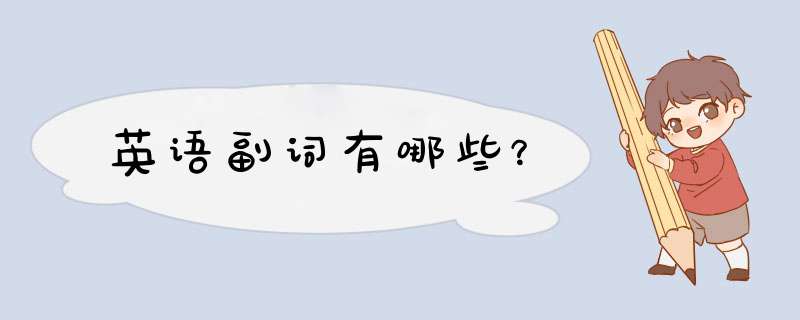
时间频率副词
now,then,often,always,usually,next,lastday,already(已经),generally(一般地),frequently(频繁),seldom/hardly(很少地),ever,never,yet,soon,too, immediately(立即),
finally,shortly(很快), before, ago,sometimes, yesterday once,twice,lately,recently,personally,todayyet
地点副词
here, there, everywhere, anywhere,somewhere, in, out, inside, outside,above, below, up,down, back, forward(向前地), home,upstairs(楼上地), downstairs, across, along, round , around,near, off, past, up, away, on
方式副词
carefully, properly(适当地), anxiously(焦虑地), suddenly, normally(正常地),fast, well, calmly(冷静地), politely(有礼貌地), proudly(自豪地), softly,warmly ,slowly,badly,hard,bravely
程度副词
much,little, very,rather(相当),so,too,still, quite, perfectly(完美地),enough, extremely(非常), entirely(整个),almost, slightly(细小地), hardly
连接副词
therefore(因此),moreover(此外),however,otherwise(另外的),then,when ,where,how,why
扩展资料
1、多数副词放在动词后面,或者放在be动词、助动词或情态动词之后,实义动词之前。 如果实义动词后有宾语,则放于宾语之后。
I am also Bush我也是布什。
I can also do that我也可以这样做。
I also want to play that games我也想玩这游戏。
I get up early in the morning every day每一天的早晨我都起得很早。
2)、副词修饰形容词时,一般放在被修饰词之前,但enough除外。
It's rather easy, I can do it这很容易,我能做到。
He did it quite well他做得相当好。
It's rather difficult to tell who is right很难说谁是对的。
He didn't run fast enough to catch the train他的奔跑速度不足以快到能够追上火车。
3、频度副词可放在实义动词的前面,情态动词和助动词的后面。
I often help him these days这些日子我经常帮助他。
I always remember the day when I first came to this school我常常记得我第一次来学校的那一天。
You mustn't always help me你不能老是帮助我。
We usually go shopping once a week我们通常一周买一次东西。
The new students don't always go to dance新学生并不时常去跳舞。
参考资料:
heartfelt没有副词形式,它的中文翻译是衷心的
词语分析:
音标:英[ˈhɑːtfelt]美[ˈhɑːrtfelt]
adj衷心的;真诚的;
短语搭配:
1、heartfelt thanks 由衷地感谢
2、heartfelt desire 由衷的心愿
3、heartfelt apology 发自内心的道歉
例句:
1、My heartfelt sympathy goes out to all the relatives
我对所有的亲属表示衷心的慰问。
2、A heartfelt apology can not only heal a damaged relationship but also make it stronger
一个真诚的道歉不仅能治愈一段受损的关系,而且能使之更牢固。
3、Compassion is a heartfelt emotion that delivers loving-kindness to everyone it touches
同情是一种发自内心的情感,它能将爱和善意传递给它所触及的每一个人。
同义词:
adj衷心的;真诚的;真心真意的
sincere/devout
知识点相关讲解这其实是现在分词和过去分词的区别:
表示情感的及物动词如excite, discourage, disappoint, encourage, inspire, interest, move, please, puzzle, surprise, worry等,其分词常加上后缀-ing或-ed转化为分词(也可称为形容词),用作表、定、状或补语。在这种情况下,分词主要体现了语态的不同。现在分词有主动意味,含有“具有令人……的特性”的意思;而过去分词有被动意味,含有“受到影响而感到……”的意思。例如:
In Aswan, there are plenty of interesting places to visit 阿斯旺有许多值得一去的地方。
Some people whose lives are full are always interesting to talk to 有些人的生活经历丰富,与他们交谈总是令人感兴趣的。
If I can find you any support, would you be interested 假如我能为你找到资助,你对此有兴趣吗?
但是,由不及物动词转化而成的分词作形容词时,则体现了时态的不同。现在分词表示该动作正在进行,而过去分词表示该动作已经完成。例如:
The woodcutter was standing next to a fallen tree 那个樵夫站在一棵伐倒的树旁。
fallen leaves落(在地上的)叶(比较:a falling leaf一片飘落的树叶)
boiled water(煮)开(过的)水(比较:boiling water沸腾着的水)
the risen sun升得老高的日头(比较:the rising sun初升的太阳)过去分词和现在分词作定语
一、过去分词作定语
作定语用的过去分词相当于形容词,其逻辑主语就是它所修饰的名词及物动词的过去分词作定语,既表被动又表完成;不及物动词的过去分词作定语,只表完成
1 过去分词用作定语,如果是单个的,常置于其所修饰的名词之前
We must adapt our thinking to the changed conditions 我们必须使我们的思想适应改变了的情况
2 过去分词短语用作定语时,一般置于其所修饰的名词之后,其意义相当于一个定语从句,但较从句简洁,多用于书面语中
The concert given by their friends was a success他们朋友举行的音乐会大为成功
3过去分词短语有时也可用作非限制性定语,前后常有逗号
The meeting, attended by over five thousand people, welcomed the great hero 他们举行了欢迎英雄的大会,到会的有五千多人
4 用来修饰人的过去分词有时可以转移到修饰非人的事物,这种过去分词在形式上虽不直接修饰人,但它所修饰的事物仍与人直接有关
The boy looked up with a pleased expression 男孩带着满意的表情举目而视
二、现代分词作定语
单个分词作定语时放在所修饰名词前,分词短语作定语时放在后,并且名词与现在分词之间存有逻辑上的主谓关系,这是区分现在分词作定语和动名词作定语的判断方法之一 。
eg a running boy
the girl standing there
并且一般都可以转化为一个进行时的定语从句
eg a boy who is running
a girl who is standing there
注意1:分词的完成时不可作定语
注意2:在message/letter/sign/news/notice等词后要用现在分词作定语,不用过去分词,这是考试的易错点。
注意3:某些现在分词作定语时,已不再表示动作,已经从分词变为了形容词词性 egan interesting story/an exciting match 这些也可以属于现在分词作定语,但是不能转化为相应的定语从句,但是可以有三级变化(原级/比较级/最高级)和被某些副词如very修饰。 一:
英语中有一些动词能带-ing而不能带不定式,这类常见的有:admit,acknowledge,anticipate,advocate,appreciate,avoid,can\'t help,can\'t resist,can\'t stand,consider,defer,delay,deny,detest,deslike,don\'t mind,escape,excuse,fancy,favor,finish,enjoy,put off,resent,risk,stop等
eg I cant\'t resist bargaining
2动词+宾语+介词+ -ing
一般常见的介词是into
eg I shamed him into returning the stolen money
这类结构的动词有blackmail,deceive,fool等,
还有介词是from的
eg What kept you from joining me
这类的基本含义是“使不”,有时候,from也可以省略
eg Imust stop you (from) destroying yourself
但是要注意如果是被动语态的时候,不能省略
二:
既能接-ing 又能接不定式的动词
attempt,begin,continue,like,need,love, omit,preger,start等,这类此无论接纳个,基本意义没什么太大区别。
还有一种就是接的不同意义不同
forget,remember,go on, mean, stop等 动词ed与动词ing作形容词用法之一: ○1 动词ed作形容词:表示被动或已发生,常作定语。The boy named Peter is my friend 那个叫做彼得的男孩是我的朋友。
此处是后置定语,划线部分起修饰作用,下同。
He’s eating fried chicken “他在吃炸鸡。”做chicken的前置定语。
There is no time left “没时间剩余了。”做time的后置定语。
I have read a novel written by Lu Xun我读了一部鲁迅写的小说。做后置定语。下同。
He lives in a house built twenty years ago 他住在一个二十年前被建造的房子里。
一般来说,定语部分不只一个词时, 常放在名词的后面。
动词ing作形容词:表示正在进行或表示功能,常作定语。
the crying boy, a running bus, the rising sun, a bus running on the road,
the boy crying in the corner (以上表示正在进行)
a sitting room, the bathing suit, a cutting machine, writing paper…… (本行表示功能)
由一些及物动词派生而来,和心理感受有关,但ed修饰人,ing常修饰物。 以下词凡是译为“使…”的及物动词,其ed形式的形容词都译为“感到…的”,其ing形式的形容词都译为“令人(感到)…的”。以下带-ed形式的词的各个短语一般都译为“对…感到…”。
及物动词, 后接人 ed形式及常见短语
excite(使兴奋,使激动) excited (be ~d about)
surprise(使惊讶,使吃惊) surprised (be ~d at)
amaze(使吃惊) amazed (be ~d at)
embarrass(使尴尬) embarrassed(be ~ed in)
encourage(使受鼓舞, 鼓励) encouraged(be ~ed at / by)
frustrate(使失望,使沮丧) frustrated (be ~d of)
interest(使感兴趣) interested (be ~ed in)
thrill(使激动/ 紧张) thrilled (be ~ed at)
terrify(使恐怖,使害怕) terrified (be terrified at/ of / with)
please (使高兴,使满意) pleased (be ~d with)
satisfy (使满意) satisfied(be satisfied with)
frighten (使害怕,使惊惧) frightened (be ~ed at / of )
tire(使厌烦) tired (be ~d of)
bore(使厌烦) bored (be ~d with)
relax(使放松) relaxed (无固定搭配)
fascinate(使着迷) fascinated (be ~d by)
ing形式
exciting
surprising
amazing
embarrassing
encouraging
frustrating
interesting
thrilling
terrifying
pleasing, = pleasant
satisfying
frightening
tiring
boring
relaxing
fascinating
annoying
moving
worrying
confusing
move(使感动)
worry(使担忧)
confuse(使困惑)
His words amazed me The news frustrated us very much (都是及物动词,后接人)
His words were amazing (修饰物) I was amazed at his words (修饰人)
How exciting the film is! (修饰物) He was moved by the movie (修饰人)
英语上没有情态副词
汉语上有:
1情态副词
指表示情态的副词如“特地、百般、互相、擅自、亲自、逐步、仍然、依然、当然、毅然、情态副词不能单说,只能作状语- 来源:汉语知识词典
2情态副词
指表示情势状态的副词这类副词如:“大力”“赶紧” “悄悄” “亲自” “互相
- 来源:实用汉语语法大辞典
3在古代汉语中情态副词常用在动词或形容词的前面充当状语,表示各种各样纷繁复杂的《廉颇蔺相如列传》必:如果确实固固不如也,且为之奈何《鸿门宴》固;确实余固笑而不信也《石钟山记》固:仍然诚诚如是,则霸业可成《隆中对》诚:果真臣诚知
- 来源:中学生古文知识辞典
4情态副词
也称“状象状字”、“情状副词”、“性态副词”、“判断副词”表示行为动作有的指“表示动作的性质或状态的副词”,如“诚”“信”“果”“故”“反”“几”“亦”“相”等
- 来源:古汉语知识辞典
(1)时间频率副词
now,then,often,always,usually,next,lastday,already(已经),generally(一般地)。
(2)地点副词
here, there, everywhere, anywhere,somewhere, in, out, inside, outside。
(3)方式副词
carefully, properly(适当地), anxiously(焦虑地), suddenly, normally(正常地)。
(4)程度副词
much,little, very,rather(相当),so,too,still, quite, perfectly(完美地)。
(5)疑问副词
how, when, where, why……。
(6)关系副词
when, where, why……。
(7)连接副词
therefore(因此),moreover(此外),however,otherwise(另外的),then,when ,where,how,why……。
(8)表顺序的副词
first,then,next,finally,afterwards,primarily……。
(9)完成时的副词
already,ever,just,never,since,yet,recently……。
扩展资料:
1、形容词形副词倾向于表静态意义,突出"感觉,状态、结果";-ly形副词倾向于表动态意义,强调"方式、方法"。由于表达的语体,语义侧重点和感情色彩不同,这两种副词有时可以互换使用,所以其内含的静动态意义也会随之变化。
2、形容词形副词不能被一个程度状语所修饰,而-ly形副词则可以。
3、形容词形副词多用在非正式语体中,而-ly形副词多用在正式语体中。
4、形容词形副词一般表示较具体的概念,而-ly形副词则表示抽象或引申意义,有时还带有一定的感情色彩。
5、在表示比较级和最高级时通常用形容词形副词来取代-ly形副词。
6、在过去分词、作主语用的动名词和强调句中被强调的成分前通常只用-ly形副词而不用形容词形副词。
参考资料:
absolutely!-绝对正确
adorable!-可爱极了
amazing!-太神了
anytime!-随时吩咐
almost!-差不多了
awful!-好可怕啊
after
u-您先
about
when-大约何时
all
set-一切妥当
allow
me!-让我来
baloney!-胡扯!荒谬
behave!-放尊重点
bingo!-中了
boring!-真无聊
brovo!-太棒了
bullshit!-胡说
crazy!-疯了
deal!-一言为定
disgusting!-好恶心呀
drat!-讨厌
Encore!-再来一次!
Exactly!-完全正确!
Fantastic!-妙极了!
Farewell!-再见!
Fifty-fifty!-对半分!
Foul!-犯规了!
Fresh!-好有型!
Gesundheit!-保重!(特别用于对打喷嚏的人说)
Gone!-跑了!
Gorgeous!-美极了!
Hopefully!-希望如此!
Horrible!-好可怕!
Hot!-好辣!
Hurrah!-万岁!
Hush!-(肃静)嘘!
Incredible!-不可思议!
Indeed-真的?
Liar!-你撒谎!
Lousy!-差劲!
Marverllous!-棒极了!
Outrageous!-不得了!
Please!-拜托了!
Probably!-很可能!
Present!-到(有)!(用于点名时)
Relax!-放轻松!
Rats!-差劲!
Speaking!-(打电话时)我就是!
Still-仍是这样?
Someday!-改天吧!
So
so!-马马虎虎!
Satisfied-满意吗?
Stingy!-小气鬼!
Superb!-棒极了!
Surprise!-给你一个惊喜!
Terrible!-好可怕!
Thirsty-渴吗!
Toast!-干杯!
Unbelievable!-难以置信!
Unisex-男女通用的?
Willingly!-很乐意!
这里有大量经典英文小说,包括许多著名的爱情故事。里面表达感情的词汇也应有尽有。
英语图书网:海量免费英文经典读物,提高英语新捷径
http://wwwenglish-booksnet/
参考资料:
欢迎分享,转载请注明来源:浪漫分享网

 微信扫一扫
微信扫一扫
 支付宝扫一扫
支付宝扫一扫
评论列表(0条)